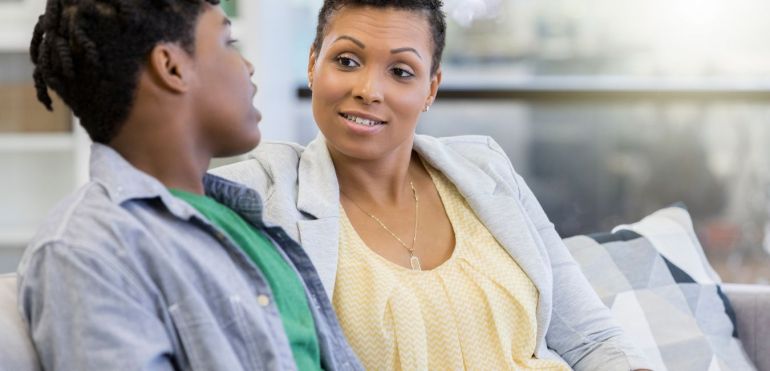By Allyson Nesmith, Digital Content Contributor
Now that my little sister has been away at college for a few months, my dad is constantly calling me with questions like, “Do you think she’s worried about anything? Her classes? Making friends?” “Should I call her, or give her space?” or “How do I make her feel supported?”
Hearing his endless string of questions (the latest of my oldest-daughter responsibilities) had me wondering—how can parents and other caring adults positively support the young people in their lives, especially as it relates to their mental health? When should they step in, or should they back away? To help me tackle these questions, I spoke with Rhonda Boyd, PhD, who is an Associate Professor in the Department of Child and Adolescent Psychiatry and Behavioral Sciences at the Children’s Hospital of Philadelphia (CHOP) and the University of Pennsylvania Perelman School of Medicine and a member of the National Scientific Council on Adolescence.
Her first piece of advice? Remember that it is okay to check in with the young people in your life.
“We often have to remind parents that it’s actually okay to check in,” said Rhonda. “You should be checking in about how they’re doing.”
It can be especially important to check in with youth when you notice key changes in their behavior, such as changes in relationships (friends, partners), and/or changes in their routines. In many cases, youth want to discuss these changes as they’re happening, but aren’t equipped with the language needed to accurately convey how they’re feeling.
As you’re checking in with your young person, make sure to express the importance of experiencing all types of emotions—both positive and negative.
“Feelings are feelings,” said Rhonda. “We all have them. Even ones that are viewed negatively.” Share with youth that it’s okay if they are feeling angry or feeling sad. There is nothing wrong with that! “They need to be validated in how they’re feeling,” Rhonda said.
She described a summer program she participated in, where the goal was to teach young people resilience and coping strategies for dealing with their emotions. They used techniques such as deep-breathing exercises if they are anxious or stressed, and counting backwards from 10 to 1 if they were angry.
“We would tell youth, ‘You’re angry about that? Well, you have a right to be angry about that.’ The next question becomes, ‘All right, so how do we work through those big feelings?’” said Rhonda.
Helping youth maintain a consistent bedtime schedule and routine can also help to positively influence their mental health. If you notice youth staying up late to complete a homework assignment, for example, see if there are ways you can help them with their time management, or understand any potential difficulties they may be facing in school.
Additionally, try to keep the bed/bedroom as a space exclusively reserved for sleep, Rhonda suggested. Oftentimes, we (myself included) use the bed as a place to do homework, eat food, or stay up late on the phone. Associating the bed as a place only to sleep can help youth as they create their bedtime routines.
Policymakers can also play a crucial role in ensuring that parents and other caring adults are equipped with the resources and guidance they need to support youth and their mental health. “I hear from policymakers all the time that they want to prioritize youth mental health, but I don’t see the actions and finances to show it,” said Rhonda. “We need more programs that focus on youth and their mental health. We need more mental health screenings. We need more mental health providers.”
Finally, as caring adults, it’s important to remember that just as we are observing youth, they are observing us. “Kids watch adults,” said Rhonda. “If adults have healthy coping skills, and handle emotions well, then kids can learn from that.”
Key Takeaways: What Adults Can Do to Support Youth Mental Health
- Check in with the young people in your life about how they’re doing--especially when you notice key changes in behavior, relationships (friends, partners), or routines.
- Validate all types of emotions—both positive and negative—and support young people to work through those big feelings.
- Remember that youth are observing and learning from how we manage our own emotions, so our own coping skills matter.
- Help youth maintain a consistent bedtime schedule and routine and encourage them to reserve their bed/bedroom as a space exclusively for sleep.
- On a policy level, we need more programs that focus on youth and their mental health, more mental health screenings, and more mental health providers.
To learn more about youth mental health and helping young people learn to cope with big feelings, listen to our Adaptivity podcast episode, “How Facing Big Feelings Can Help Build Mental Health,” with Dr. Lisa Damour, psychologist and New York Times bestselling author.



